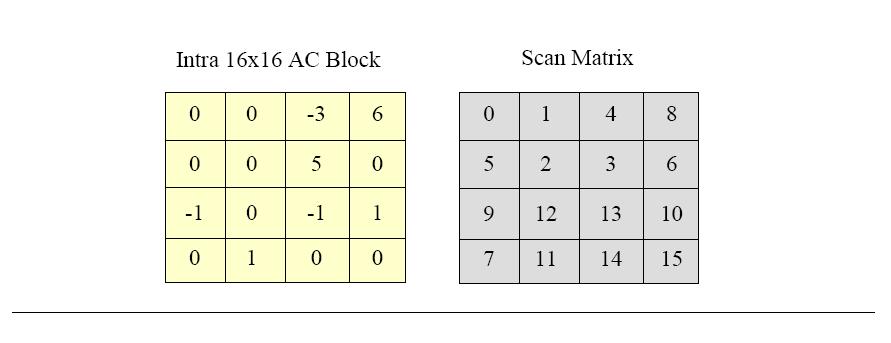Calculates characteristics of 4X4 block for CAVLC encoding.
Syntax
IppStatus ippiEncodeCoeffsCAVLC_H264_16s(const Ipp16s* pSrc, Ipp8u AC, const Ipp32u* pScanMatrix, Ipp8u Count, Ipp8u* Traling_One, Ipp8u* Traling_One_Signs, Ipp8u* NumOutCoeffs, Ipp8u* TotalZeros, Ipp16s* pLevels, Ipp8u* pRuns);
Parameters
pSrc |
Pointer to 4x4 block - array of size 16. |
AC |
Flag that is equal to zero in the cases when zero coefficient should be encoded, and is equal to one otherwise. |
pScanMatrix |
Scan matrix for the coefficients in block (array of size 16). |
Count |
Position of the last non-zero block coefficient in the order of scan matrix. It should be in range [AC; 15]. |
Traling_One |
The number of “trailing ones” transform coefficient levels in a range [0;3]. This value is calculated by the function. |
Traling_One_Signs |
Code that describes signs of “trailing ones”. (Trailing_One -1 - i)-bit in this code corresponds to a sign of i-“trailing one” in the current block. In this code 1 indicates negative value, 0 - positive value. This value is calculated by the function. |
NumOutCoeffs |
The number of non-zero coefficients in block (including “trailing ones”). This value is calculated by the function. |
TotalZeros |
The number of zero coefficients in block (except “trailing zeros”). This value is calculated by the function. |
pLevels |
Pointer to an array of size 16 that contains non-zero quantized coefficients of the current block (except “trailing ones”) in reverse scan matrix order. Elements of this array are calculated by the function. |
pRuns |
Pointer to an array of size 16 that contains runs before non-zero quantized coefficients (including “trailing ones”) of the current block in reverse scan matrix order (except run before the first non-zero coefficient in block, which can be calculated using TotalZeros). Elements of this array are calculated by the function. |
Description
The function ippiEncodeCoeffsCAVLC_H264_16s is declared in the ippvc.h file. This function calculates some characteristics (Trailing_One, Trailing_One_Signs, NumOutCoeffs, TotalZeros, pLevels, pRuns) of a 4x4 block for CAVLC encoding. See Figure "EncodeCoeffsCAVLC_H264 Operation" for an example of the function operation:
Count = 13.
Trailing_One = 3 (-1, 1, 1) Trailing_One_Signs = 00000100 NumOutCoeffs = 7 TotalZeros = 6
This function is used in the H.264 encoder included into Intel IPP Samples. See introduction to H.264.
Optimization Notice |
|---|
|
The Intel® Integrated Performance Primitives (Intel® IPP) library contains functions that are more highly optimized for Intel microprocessors than for other microprocessors. While the functions in the Intel® IPP library offer optimizations for both Intel and Intel-compatible microprocessors, depending on your code and other factors, you will likely get extra performance on Intel microprocessors. While the paragraph above describes the basic optimization approach for the Intel® IPP library as a whole, the library may or may not be optimized to the same degree for non-Intel microprocessors for optimizations that are not unique to Intel microprocessors. These optimizations include Intel® Streaming SIMD Extensions 2 (Intel® SSE2), Intel® Streaming SIMD Extensions 3 (Intel® SSE3), and Supplemental Streaming SIMD Extensions 3 (Intel® SSSE3) instruction sets and other optimizations. Intel does not guarantee the availability, functionality, or effectiveness of any optimization on microprocessors not manufactured by Intel. Microprocessor-dependent optimizations in this product are intended for use with Intel microprocessors. Intel recommends that you evaluate other library products to determine which best meets your requirements. |
Return Values
ippStsNoErr |
Indicates no error. |
ippStsNullPtrErr |
Indicates an error condition if at least one of the specified pointers is NULL. |
ippStsOutOfRangeErr |
Indicates an error when Count is out of range [AC; 15]. |



